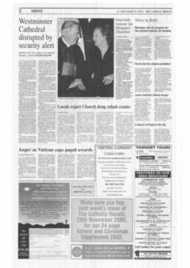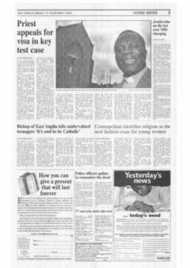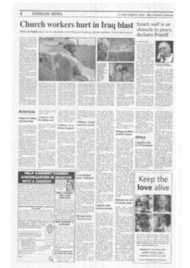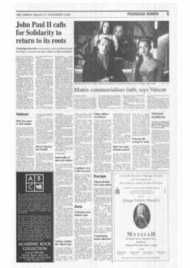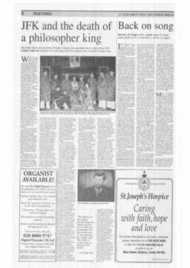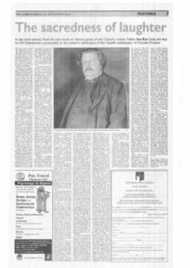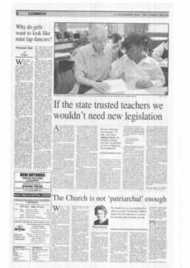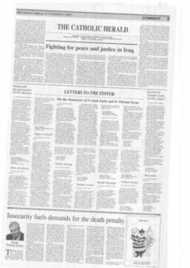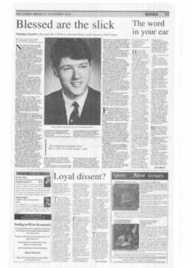Page 9, 21st November 2003
Page 9
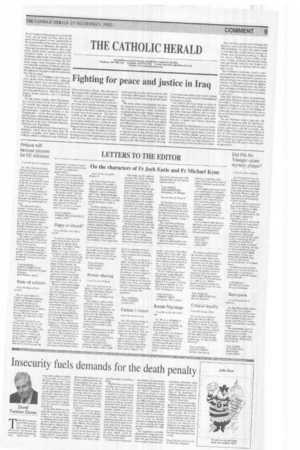
Report an error
Noticed an error on this page?If you've noticed an error in this article please click here to report it.
Tags
Share
Related articles
Cartoon Characters Come To Life In A London Church
Published By The Catholic Herald Ltd, Herald House, Lambs...
Catholic Herald Web Resources
Rolheiser Lectures Later This Month
THE CATHOLIC HERALD
Herald House, Lamb's Passage, Bunhill Row, London EClY 8TS) Telephone: 020 7588 3101 Facsimile: 020 7256 9728 E-mail: [email protected] Website: www.catholicherald.co.ult
Fighting for peace and justice in Iraq
As TFIE situation in Iraq seeins to worsen by the week, and the death toll rises, there is one group which appears to have figured little in the reconstruction of the country, namely the one million or so Christians, the majority of whom are Eastern-rite Catholics. This week, Father Denka Toma, superior general of the Antonian Order of St Ormizda of the Chaldeans, called on the United States to speed up the hand over of power to Iraqis. He, like many Iraqis, both Christian and Muslim, welcomed the toppling of Saddam Hussein's regime, but he had not anticipated how quickly the euphoria of liberation would be replaced by fear and insecurity.
For all the evils of Saddam's rule, Christians were, on the whole, treated well. Although Christian schools were nationalised in 1974, Christians were allowed the freedom to worship and churches, like mosques, received free water and electricity. Tariq Aziz, the Iraqi deputy prime minister, was a Chaldean Catholic.
No one knows exactly when Christianity first arrived in Iraq, but the Acts of the Apostles records that among those gathered in Jerusalem at Pentecost were people from Mesopotamia. Catholics belong to the Chaldean rite — by far, the most numerous — and the Syrian, Armenian and Latin rites. The other Christian communities include the Assyrian Church of the East, Oriental Orthodox, Orthodox, and Protestants.
Today around half of Iraq's Christians live in Baghdad, where there are more than 50 churches, together with Babel Pontifical College, which is affiliated to the Pontifical Urban University in Rome. The other area of the country with a significant concentration of Christians is in the Kurdish north, which contains a number of ancient monasteries.
The optimism many Christians held for a new Iraq, free from the tyranny of Saddam, has been slowly ebbing away over these last six months as the flaws in America's post-war strategy have been exposed. The lack of security on thc streets, jobs, and adequate civic services, such as water and electricity, leaves Iraqis baffled: how is it that the most powerful nation on earth cannot provide something as basic as around-the-clock electricity?
But more worryingly, the failure of America to deliver peace, prosperity and self-rule has given way to terror and insurrection. More than 420 American soldiers have now been killed since the invasion and occupation, with more than 1,800 injured. Attacks on American troops are currently running at around 30 per day. The most sinister development has been the appearance of suicide bombers, a feature that is all too familiar in Israel. In October, suicide bombers brought carnage to the streets of Baghdad, first at the UN headquarters, where 22 people were killed, and then at the Red Cross headquarters, where 40 were killed and 200 injured. As to how many Iraqis have been killed or injured, no one seems to know.
Of course, the Americans are not the only occupying force in Iraq. Britain controls the south and troops and personnel from other countries, such as Poland and Italy, are also playing a role. The British approach of trying to win hearts and minds seems to have worked better than the gung-ho tactics often employed by American troops., The Church has been trying to make its voice heard in the middle of this catastrophic situation, and some Christian leaders have met with American officials. But it seems that the Americans, bunkered down in wellfortified former palaces, prefer, more often than not, to ignore local advice, believing they know best.
It is crucial that Christians have a say in the future of Iraq. Out of the 25 members on the interim Governing Council, there is just one Christian, Yonadam Kanna, general secretary of the Assyrian Democratic Movement. At a local level, there are four Christians on the council that governs the Mosul province. There are fears among some Christians that Iraq may come under the rule of the majority Shia population. In April, Shia clerics made it clear that they wanted Iraq to become an Islamic state governed according to Sharia law. And in a Friday sermon in May, in the town of Kufa, Ayatollah Mohammed Sadeq Sadr specifically called for the Sharia to be imposed, not only on Muslims but on Christians as well.
The Chaldean Church has issued a statement asking that any future Iraqi constitution should guarantee them the right to "profess our faith according to our ancient traditions and our religious law, the right to educate our children according to Christian principles, the right to freely assemble, to build our places of worship, and our cultural and social centres according to our needs".
Pope John Paul II has called an extraordinary synod of the Chaldean bishops in Rome from December 2-3 to elect a successor to Patriarch Raphael I Bidawid, who died in July. This follows the failure of any of the bishops to receive the necessary two-thirds of the vote at the synod held in Baghdad during August and September.
The new Patriarch faces a huge task. He will have to negotiate with the Americans, continue the ecumenical work of his predecessor, particularly with the Assyrians, and build bridges with Muslim leaders. On top of this, he will have to institute parish renewal and develop educational opportunities for young Christians, many of whom look to a new life in the West. He faces a crisis, but also an opportunity.
blog comments powered by Disqus



